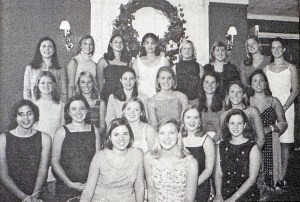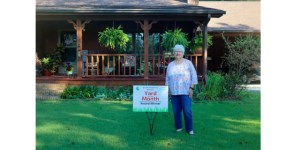The Town Crier: Ghost signs of the ‘Superette’
Published 2:45 pm Monday, March 7, 2011
I call them “ghost signs.” They’re the brick walls painted over with not enough paint to hide the old sign painted underneath that was there for years. Sometimes you can make out what it says. Sometimes there’s just enough to clue you to what it was, like a splash of red and the phrase “…pause that refreshes…” that tells you it was a Co-Cola sign. And sometimes there’s only a phantom bit hinting through so that just folks who remember the sign when it was bright and new can decipher it.
Trending
Heading south out of town I saw just such a ghost. Coming over what some people know as “Hilltop” on U.S. Highway 41 South, AKA South Dixie Highway, and approaching the intersection of Five Springs, I saw a familiar white building, and high up on its side, painted over black letters peeked out from the past. Most drivers whizzing by wouldn’t even notice it, much less make out the words. But I knew the words by heart and the memory behind my eyes filled in the flaky paint gaps to read the sign as clearly as the day it was painted: Lucille’s Grocery.
Lucille’s was what used to be more widely known as a “superette,” a community store that served as a pocket-sized grocery. It was for grabbing milk and bread on the way home from work, or a place for the kids to get snacks or a soft drink after school. It acted as a tide-me-over till the weekly shopping trip to a big super market or as a nearby place to grab a few things before bad weather hit or in case somebody dropped in at dinner time and you needed something extra for the extra mouths.
These days we have “quickie marts” and they serve many of the same functions of the superette, but there are some important differences. Most quickie marts are a shop that is paired with a gas station. It’s a place where locals and travelers alike stop in and get something on the run as they fill up with gas. The quickie marts are generally chain owned and from chain to chain they can be identical. If you were in a Shell or RaceWay here and got in a transporter machine (like on “Star Trek,” with the cool sound) and went to another one hundreds of miles away you probably couldn’t tell the difference. Corporate chains like that use the exact same blueprints for the buildings and even have shelf plans so that no matter what store you’re in the chips are in exactly the same place, and the gum and the sodas around the wall.
Personal service
Superettes (and I’ll talk about them in the past tense even though there are still many around), were privately owned, usually by the person behind the cash register. Each building was different and each selection of products unique to the store. Sometimes the choice would be what the owner wanted to sell, what they got a good deal on from the distributor, who they knew at a distribution company (i.e. a cousin at the bread company) and what they knew their customers wanted.
If they had a steady customer from just down the road that liked dill pickle-flavored potato chips then they made sure they had those chips on hand. Customers could request things they wanted. For example, “why don’t you have those creamsicles? My kids love those.” The next time the ice cream man came along, they could buy a box and there you go, the customer got what they wanted and the owner increased sales.
Trending
Try going in a chain store and get them to put in a requested item. The manager would have to talk to the district manager who would have to talk to the regional manager who would have to request it from the purchasing VP who would have to talk to the distribution manager who would put it to the survey board and it would finally end up on the desk of the vice president in charge of NO!
In addition to being customer-friendly, superettes were also handy. Every half mile or so it seems there would be one. A couple near where I grew up were just an intersection away from each other, the Antioch Superette and the Riverbend Grocery. The Riverbend store was originally started in the house of Mr. Schuler. He then built the store that still stands there today. Back then almost all the little stores would give credit since people lived from paycheck to paycheck.
My grandfather got a kick out of the psychology Mr. Schuler would use to collect payment. If he saw you out in town and knew that you owed him, say, $22, he would come up to you and ask, “Hey, when are you going to pay me that $30 you owe me?” The person would get flustered and say, “I don’t owe you $30, I only owe you $22. Here, just take it!” And they’d pay him off right then.
My other grandfather had a little store between those two, but he had gotten out of the business by the time I came along. I do know that he had the store and my father had worked in it which helped Dad get a job running the PX (Post Exchange) in the army, which was a lot better job than guarding the border from a foxhole against a sneak attack from the North Koreans.
Remembering Shorty’s and Midget’s Grocery
Heading down Dug Gap Road there’s a block building on the left that now houses a commercial business, but when I was a kid it was “Shorty’s.” I don’t know if that was the name on the sign or just what we called it because of the owner’s nickname. I was a kid so he seemed pretty tall to me. He also had a successful store and I remember when they added on and expanded it. The other big news was that they had a shootout there when someone tried to rob the place. I can’t remember if anybody was hurt but I’m sure the robber lost a couple of years off the back end of his days from the fright when the gunplay started going in both directions. But if you go into a store that’s owned by the person standing there it’s just like you’ve come into their house to rob them, so watch out bad guys.
Dug Gap had Shorty’s, but U.S. 41 south of town had Midget’s Grocery. This was a local superette owned by a husband and wife who were little people. They ran a great little store (no pun intended) and as a kid it was a good way to learn about people who were physically different from you. The first few times I went in, it was all about the short owners. But soon the novelty went away and the couple was just the owners, just like any other store proprietor I was familiar with. My little kid cousin did however think that Midget’s Grocery was where you went to get whiskbrooms.
Lucille’s was probably the superette I went to the most since it was the one closest to my grandparents’ house. I can remember going in there time after time with my grandfather. He would pick up the bread, or milk or some Copenhagen, and in the back Lucille had one of those old butcher coolers, made out of enameled metal with the big glass front. Inside were logs of cold cuts that she would slice to order and a big cheese wheel that sat on top. My grandfather would always ask me if I wanted something. I would usually say “no,” but sometimes I would ask for a Coke or some gum and every once in a while, if there was a particularly intriguing cover, I would pick a comic out of the comic book rack that would rotate. I especially liked the scary ones like “House of Mystery” or maybe a Western.
Lucille was a familiar figure, kind of like an aunt, and you felt like you knew her quite well. However, I did find out just recently that the comfortable type of dress she seemed to always wear was not just a fashion statement, but with its deep pockets, they were also a security measure. Evidently she packed heat down in that pocket. She had been burgled a time or two, but luckily for her, or more likely, the perp (cop talk for perpetrator), she never got robbed while on duty.
Glass gold
Outside her store as you walked in was a rack with wooden Coke bottle crates. My cousin and I learned that you could get a deposit return for any glass bottles turned in. More than one summer started with us deciding to get rich off the tossed out glass Coke bottles that littered the roadsides. This was just before the No-Litter Indian Chief, Iron-Eyes Cody, was starting to shed a tear for trash, so an open car window was still a common garbage disposal. One of two things happened to our plan: We got caught up collecting the bottles for the exotic destinations printed in glass on the bottoms of the bottles that identified where the bottles were from, places like Little Rock, Ark., or maybe Montgomery, Ala.
Or, we’d bring in a red wagon full of bottles and only walk out with a dime or two. The dimes we walked away with were pay for several hot June days trolling the roadsides for glass gold. Better to wait for a trip with grandfather and ask for chewing gum or those candy cigarettes they don’t sell anymore.
We still have superettes around. They are out in the county at various places and in town we actually have a new generation of superettes in the Latino stores here. You’ll find meats in the back, a selection of produce and a mix of homegrown as well as imported Mexican products. We also have a couple of Asian markets that you should take your kids to, because they have some fun, unusual and tasty items in there.
The superette was a corner meeting place and a familiar shop stop for the community, where a son and his dad could go in for a can of deviled ham and some soda crackers to take on a fishing trip, or for a kid and his grandfather to pick up a half gallon of buttermilk for the cornbread that night. If you stop in at a local superette, take a look around and don’t be in a hurry. You might just get a deal on a heapin’ helpin’ of hospitality.
Mark Hannah, a Dalton native, works in video and film production.





